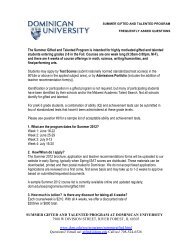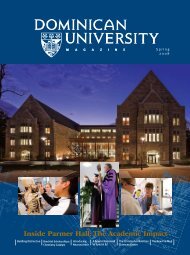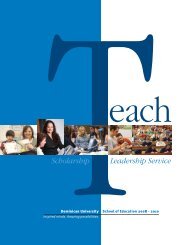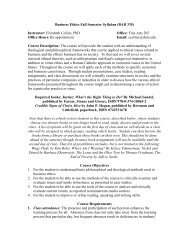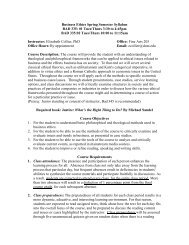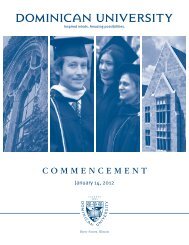6 2 - Dominican University
6 2 - Dominican University
6 2 - Dominican University
Create successful ePaper yourself
Turn your PDF publications into a flip-book with our unique Google optimized e-Paper software.
On Tuesdays, Professor Dianne Costanzo, PhD, guides her<br />
students in exploring theories of virtue and happiness, and she<br />
leads intriguing discussions on choices of good and evil, challenging<br />
the students to contemplate ways of being their best selves.<br />
On Thursdays, Costanzo Sensei puts those theories of virtue, choice<br />
and contemplation into action as her students kneel side by side<br />
listening, observing and repeating the lessons of aikido – “the art<br />
of peace.” In her senior seminar entitled “Aikido as Contemplation”<br />
Costanzo applies the Japanese martial art and the texts of Aristotle to<br />
guide students in understanding virtue and what it means to be a<br />
virtuous, noble person, and how choices contribute to who we are in<br />
the world.<br />
“Aikido is a form of self-defense that teaches a unity of mind and<br />
body,” Costanzo says. “With aikido, the body informs the mind and<br />
vice versa, and the lessons learned are about being the best we can<br />
be. Aristotle says that virtue and happiness are in accordance, so in<br />
our seminar we learn how to put theoretical learning into our bodies<br />
to achieve holistic learning of mind, body and spirit.”<br />
A trained spiritual director with a master’s degree in spirituality,<br />
a doctorate in literature, and a fourth-degree black belt in aikido,<br />
Costanzo is uniquely qualified to lead the seminar. A member of the<br />
<strong>Dominican</strong> faculty since 1997, Costanzo has taught in Oak Park since<br />
2000 and earned the title “Sensei” in 2002. In 2009, she opened her<br />
own dojo (school) in Oak Park.<br />
Literally translated, aikido means “the way of harmony through<br />
energy,” and unlike other martial arts of karate or tae kwon do,<br />
there are no competitions, contests or trophies, nor does it involve<br />
strikes or kicks, but rather uses dynamic movement, throws and<br />
joint locks to achieve nonviolent resolution to conflict.<br />
“Aikido is about achieving self-realization and transcending the ego,<br />
so in our lessons we learn how to fall and roll,” Costanzo says.<br />
“If you fall down seven times, you get up eight times. The lesson<br />
here is that we all fall and we all fail, but we don’t want to stay in<br />
failure. We learn to get up from a fall and to recover from failure.”<br />
Through aikido and the study of Aristotle, students learn the importance<br />
of living and being in the present, rather than being trapped in the<br />
past or forecasting to the future. “In life, we are always choosing,”<br />
Costanzo says. “We choose how to act and we can choose to do good<br />
or not. My goal is to have students come away from the class with a<br />
clear understanding of their choices and way of being in the world.”<br />
FEATURE<br />
“I never imagined that in six weeks a class could change me so<br />
much,” says Estefania Alberttis, an education and Spanish studies<br />
major. “The new perspective gained from studying Aristotle and<br />
aikido together has led me to truly become conscious of what it<br />
means to be good and lead a happy life. Now that I have taken this<br />
class, I have a responsibility to act and not just wish things would<br />
happen. If I want our community to be better, I need to make it<br />
happen and not wait for someone else to do it.”<br />
“Both aikido and Aristotle require a lot of thinking and really using<br />
your brain,” says Shannon Perry, a food science major. “Professor<br />
Costanzo expects great things from us and she expects participation<br />
because you can’t learn anything by just sitting there. We don’t have<br />
to be good at it, we just have to be willing to show up at the mat and<br />
try.” Because Perry values the discipline so much, she signed on to<br />
continue studying aikido for an additional 12 months.<br />
Indeed, aikido is a martial art that is practiced into old age, so for<br />
Costanzo’s seminar the only requirement is an openness and<br />
willingness to try, and to participate both in the discussion and at the<br />
mat. “If you hold people to be the best they can be, most times they<br />
rise to the occasion. It is up to the student to say ‘yes’ or ‘no,’”<br />
Costanzo says.<br />
While the seminars are a distinctive element of the <strong>Dominican</strong><br />
curriculum (see sidebar article on page 9), the “Aikido as<br />
Contemplation” seminar is an especially unique offering.<br />
“The seminars are a beautiful place for faculty to be creative,”<br />
Costanzo says. “Wonderful things are happening in the seminars.”<br />
“The seminars are more about life lessons than anything else; they teach<br />
us to be better individuals and take responsibility for our small part of<br />
the world,” Alberttis concludes. “They open our eyes to issues that we<br />
may not encounter in our daily lives and force us to embrace what it<br />
really means to be part of a <strong>Dominican</strong>, Catholic community.”<br />
Dianne Costanzo, PhD<br />
Fall 2010 <strong>Dominican</strong> <strong>University</strong> Magazine<br />
15



